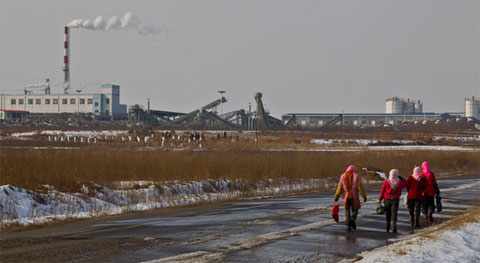China and nuclear power strategy
The crisis in Japan stalled the nuclear industry in many countries, but in China, high energy demand makes the field still hot.
Here's an analysis of The New York Times about the possibility of China sticking with nuclear power.
Last summer, the German parliament voted to shut down its nuclear power plants until 2022, while the Swiss parliament voted to partially close the nuclear program by 2034. Depression The economy in the US and in most developed economies since 2008 has reduced demand for electricity, leading to a reduction in interest in nuclear power.

A nuclear power plant near Beijing. China gave
Complete examination of nuclear facilities after the Kukushima incident in Japan. (Photo: NYT)
In Japan, the government stopped plans to build more nuclear power plants and faced a political war to keep existing reactors going. Emerging economies like Brazil and especially India still plan to build more nuclear reactors. However, in September, Indian leaders passed a bill which increased the independence of nuclear supervisors on the industry, although critics were skeptical.
Continue but be safe
This situation makes China, in just a few years, become more constructive country than any other country in the world combined. After the incident in Fukushima, Chinese inspectors spent four months examining all existing reactors and furnaces that would be built, and declared all safe. Safety inspections will continue for furnaces that were not built at the time of the Fukushima incident.
Jiang Kejun, director of the Energy Research Institute of the National Development and Reform Commission, China's top policy-making body, said the government was consistent with the goal of 50 gigawatts of nuclear power before the year. 2015, compared with 10.8 gigawatts at the end of last year.
Other Chinese officials stressed that increasing electricity consumption in China makes nuclear power a pressing need. They believe that the Fukushima incident is a useful lesson for the nuclear power industry.
While continuing to study safety improvements, the government just did not allow the construction of unapproved reactors, as of March this year.
At the end of last year, nuclear power accounted for only 1.1% of China's total electricity production. Along with the current speed of building wind and coal power plants far beyond the construction speed of any other country in the world, nuclear power in China is likely to account for less than 4%. national electricity production in 2015.
Gradually reduce dependence on coal
Coal is still the main source of electricity production in China, generating a quarter of the country's electricity. Nuclear power is more than coal in terms of continuous supply. And it is focused on nuclear power by China because it has set ambitious goals to gradually reduce global warming emissions.
Until there are reliable replacements of electricity from wind and solar, China continues to depend on nuclear power as a fundamental part of its integrated energy source.
Coal is the most polluting source of electricity causing climate change emissions while nuclear power is the cleanest source. Accidents in coal mining in China each year kill over 2,000 people, and a large area in China's northern countryside is seriously polluted.
However, China pays special attention to nuclear safety because they have some of the most densely populated rural areas in the world. If a nuclear accident happens to make a small area around a nuclear power plant impossible to live, many people need to relocate.
Technology transfer
China today has a wide range of reactors of all types, using French, American, Russian, and homemade furnaces. When approving contracts designed for a variety of multinational contractors on nuclear power plants, China requires them to provide accurate documents on how to build nuclear reactors.
This makes China likely to become a reactor exporter in the next few years, competing with industrialized countries. The world 's demand for reactors could be increased if memories of the Fukushima accident fade or if worries about global warming become more urgent.
China not only captures technology, they also create a economies of scale by building many reactors at the same time. Every year, a population of nearly ten million migrants come to live in cities, with air conditioning requirements and countless other power-hungry devices. Electricity consumption may continue to increase with double digits.
Dennis Bracy, director of the US-China Bilateral Forum on Clean Energy, commented: 'It is the largest migration in history' and 'I believe they (China) will stick with the nucleus as a part of the total energy source. '
- US nuclear power pilot 'super safe'
- Germany closed a series of nuclear power plants
- China will maintain the development of nuclear power
- China - Russia builds a floating nuclear power plant
- China builds a fourth generation nuclear power plant
- Vietnam nuclear power needs to have standards
- China set up a center to rescue the first nuclear power incident
- Situation of world nuclear technology
- Nuclear power plant will be built in turn-key area
- VND 200 billion propaganda for nuclear power development
- The first floating nuclear power plant will operate in 2016
- Nuclear power against climate change
 Is the magnetic North Pole shift dangerous to humanity?
Is the magnetic North Pole shift dangerous to humanity? Washington legalizes the recycling of human bodies into fertilizer
Washington legalizes the recycling of human bodies into fertilizer Lightning stone - the mysterious guest
Lightning stone - the mysterious guest Stunned by the mysterious sunset, strange appearance
Stunned by the mysterious sunset, strange appearance